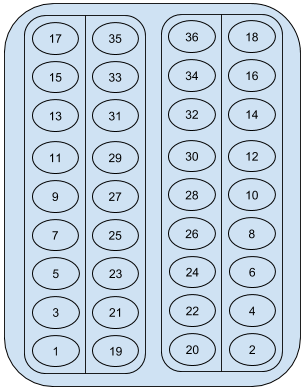- 焦虑驱动的成长:从Bushcraft到AI的启示
腾讯的IMA工具,将公众号和我个人的知识库融合在一起,精准地回答了这个问题:Bushcraft和Glamping玩法的区别是什么?我在想,2019年那时,我受长安邀请,参加了《天空下周末》的Glamping大会,我们创建了Bushcraft野营区,野性和Glamping的文明有些格格不入。那个时候,我被一个问题困扰:都是美好的生活方式,Glamping我喜欢,Bushcraft我也喜欢,到底应该选
- C/C++编译原理
weixin_33809981
转自:http://m.blog.csdn.net/blog/business122/21722039http://m.blog.csdn.net/blog/business122/21722151C/C++编译就是要将C/C++的代码映射到相应的机器码,以及讨论其中的内存管理模式,包括内存的分配,如何使用等等,整型、数组、指针等这些在内存中的实现机制。C/C++的编译包括几个部分,分别是编译,汇
- INA226中文手册自译 - 高低端电流检测IC,电流电压测量芯片
盛郁舸Ferris
INA226中文手册自译-高低端电流检测IC,电流电压测量芯片【下载地址】INA226中文手册自译-高低端电流检测IC电流电压测量芯片分享INA226是一款分流和电源监控器,具有I2C或SMBUS兼容接口。该器件能够监控分流压降和总线电源电压,并通过可编程校准值、转换时间和均值,结合内部乘法器,直接读取电流(安培)和功率(瓦特)。INA226适用于高端或低端电流检测,检测共模总线电压上的电流,其变
- Integrated Business Functions
后端
Year2IntegratedBusinessFunctions(2025SpringTerm)Module6:FinancingforGrowthAssignment1(Individual)ThisisanINDIVIDUALassignment.Thisassignmentismarkedoutof100.Itisworth20marksofthetotalcoursescores(i.e.
- 车载音频配置(一)
漫步的傻瓜
Android车载音频系统音视频
目录Audiocontexts启用AAOS路由主音频区乘员区域音频配置在Android10中,car_audio_configuration.xml取代了car_volumes_groups.xml和IAudioControl.getBusForContext。音频政策文件通常包含在vendor分区中,表示主板的音频硬件配置。car_audio_configuration.xml中引用的所有设备都
- 2024年03月CCF-GESP编程能力等级认证Python编程四级真题解析
码农StayUp
pythonCCFGESP青少年编程
本文收录于专栏《Python等级认证CCF-GESP真题解析》,专栏总目录:点这里,订阅后可阅读专栏内所有文章。一、单选题(共15题,共30分)第1题小杨的父母最近刚刚给他买了一块华为手表,他说手表上跑的是鸿蒙,这个鸿蒙是.()A.小程序B.计时器C.操作系统D.神话人物答案:C本题属于考察计算机基础知识。鸿蒙是操作系统,操作系统是管理计算机硬件与软件资源的程序,同时也是计算机系统的内核与基石。它
- TotalSegmentator 安装和配置指南
江望珣Vaughan
TotalSegmentator安装和配置指南TotalSegmentatorToolforrobustsegmentationof>100importantanatomicalstructuresinCTimages项目地址:https://gitcode.com/gh_mirrors/to/TotalSegmentator1.项目基础介绍和主要编程语言项目介绍TotalSegmentator是
- TotalSegmentator:一站式医学影像分割工具
柯江同
TotalSegmentator:一站式医学影像分割工具TotalSegmentatorToolforrobustsegmentationof>100importantanatomicalstructuresinCTimages项目地址:https://gitcode.com/gh_mirrors/to/TotalSegmentator项目基础介绍及编程语言TotalSegmentator是一个强
- ️ 总览:TotalSegmentator - 医学影像分割的革新者
金斐茉
️总览:TotalSegmentator-医学影像分割的革新者TotalSegmentatorToolforrobustsegmentationof>100importantanatomicalstructuresinCTimages项目地址:https://gitcode.com/gh_mirrors/to/TotalSegmentator在医学图像处理领域中,精确且高效的自动分割工具对于研究和
- 供应链商业数据分析求职指南:技能点、工具包与业务模式全解析
xl.liu
数据分析数据挖掘
引言随着中国经济的快速发展,国内企业对供应链管理的关注度日益增加。为了应对激烈的市场竞争,企业纷纷寻求通过优化供应链来提高效率、降低成本并增强响应速度。在这个背景下,供应链商业数据分析(SupplyChainBusinessAnalytics)作为连接数据与决策的关键桥梁,逐渐成为企业不可或缺的一部分。对于有志于从事这一领域的专业人士而言,掌握必要的技能、熟悉先进的工具以及理解特定的业务模式是成功
- 安卓tv 移植移远4G模组调试
醉恋秋枫
安卓投影网络
移远4G模组调试USB连接EC200M-CN模组上电并reset下连接成功后,在终端输入“lsusb”命令即可显示移远的模组。如下图2c7c即表示识别到了移远的模组marconi:/$lsusbBus001Device001:ID1d6b:0002Bus001Device004:ID2c7c:6002Bus002Device001:ID1d6b:0003Bus001Device002:ID1a40
- 聚焦工控物联网网关
明达技术
物联网
一、引言在工业物联网高速发展的当下,工控物联网网关作为连接工业现场设备与上层管理系统、云平台的关键组件,其兼容性与可扩展性至关重要。工业生产新技术、新设备不断涌现,企业数字化转型需求持续增长,网关的适配与扩展能力直接影响工业物联网系统的效能与发展前景。二、兼容性的关键体现(一)多协议支持工业现场通信协议多样,如Modbus、OPCUA、Profibus等。不同厂家设备协议各异,网关需支持多种协议,
- YOLOv11算法与改进版YOLOv11算法对比:性能提升与优化
m0_54717829
YOLO算法目标跟踪
YOLOv11算法与改进版YOLOv11算法对比:性能提升与优化提示:文章写完后,目录可以自动生成,如何生成可参考右边的帮助文档文章目录YOLOv11算法与改进版YOLOv11算法对比:性能提升与优化前言一、YOLOv11算法概述二、训练步骤2.验证数据的数据代码2.改进版YOLOv11算法的创新a.改进的特征提取网络b.多通道特征融合机制c.自适应损失函数d.动态推理优化3.改进版YOLOv11
- hive—常用的函数整理
风子~
hivehadoop数据仓库
1、size(split(...))函数用于计算分割后字符串数组的长度1)实例:由客户编号列表计算客户编号个数--数据准备withtmp_test01as(select'tag074445270'tag_id,'202501'busi_mon,'012399931003,012399931000'index_valunionallselect'tag074445271'tag_id,'202501
- 《Operating System Concepts》阅读笔记:p2-p8
codists
读书笔记systempython
《OperatingSystemConcepts》学习第2天,p2-p8总结,总计7页。一、技术总结1.operatingsystemAnoperatingsystemissoftwarethatmanagesacomputer’shardware。2.systembusdatabus,addressbus,controlbus统称为systembus。二、英语总结(生词:5)1.myriad(1
- 总结了Vue3的七种组件通信方式,别再说不会组件通信了
全栈战神
vue.js前端javascript
写在前面本篇文章是全部采用的这种组合式API写法,相对于选项式来说,组合式API这种写法更加自由,具体可以参考Vue文档对两种方式的描述。本篇文章将介绍如下七种组件通信方式:propsemitv-modelrefsprovide/injecteventBusvuex/pinia(状态管理工具)开始搞事情~举一个栗子俗话说的好,学习不写demo,那就是耍流氓~本篇文章将围绕下面这个demo,列表_和
- 面向对象编程思想--UART设备(Modbus AND AT)
Amber762
面向对象编程网络stm32嵌入式硬件单片机
现在设计一个UART设备的驱动框架,针对AT指令模块和Modbus协议。要整合状态机、时间窗机制,同时满足各种AT指令设备的需求,并且考虑Modbus的解析。首先,AT指令设备包括ESP32、NB-IoT模块、4G模块等,这些都是通过UART使用AT指令控制的。另外还需要支持Modbus协议,所以框架需要兼容不同协议。AT指令通常需要状态机来处理异步响应,比如发送AT命令后等待OK或ERROR。同
- pymodbus Server和Client示例
漫无目的行走的月亮
python前端服务器
PyModbus是一款功能强大且易于使用的Modbus协议实现库,适用于工业自动化、物联网、能源管理和数据分析等领域。Server:frompymodbus.serverimport(ModbusTcpServer,)frompymodbus.datastoreimport(ModbusSequentialDataBlock,ModbusServerContext,ModbusSlaveConte
- 【linux numa】 NUMA 绑核
Dayu_log
linuxlinux
1.NUMA的前世今生NUMA(NonUniformMemoryAccess)和UMA(UniformMemoryAccess)是两种CPU相关的硬件架构。在早期的UMA架构中,CPU通过前端总线(FSB,FrontSideBus)连接到北桥芯片,然后北桥芯片连接到内存,即内存控制器集成在北桥芯片中。外部IO设备与南桥芯片相连,南桥芯片与北桥芯片通过内部总线相连。下图为UMA架构图下图为早期的UM
- 计算机网络原理试题六
minaMoonGirl
计算机网络
一、单项选择1.(单选题,5分)IP地址中网络号的作用有A.指定了设备能够进行通信的网络B.指定了主机所属的网络C.指定了被寻址的子网中的某个节点D.标志了网络中的主机答案:B2.(单选题,5分)关于IP主机地址,下列说法正确的是A.网段部分不可以全1也不可以全0B.主机部分可以全1C.主机部分可以全0D.网段部分可以全1也可以全0答案:A3.(单选题,5分)第一个八位组以二进1110开头的IP地
- 2024年06月中国电子学会青少年软件编程(Python)等级考试试卷(五级)答案 + 解析
伶俐角少儿编程
python少儿编程青少年编程等级考试中国电子学会青少年编程
青少年软件编程(python)等级考试试卷(五级)一、单选题(共25题,共50分)range()函数的基本用法是什么?()A.生成一个等差数列B.生成一个随机数列C.生成一个递增数列D.生成一个递减数列正确答案:A答案解析:range()函数用于生成一个等差数列,其中起始值、终止值和步长可以根据需要指定。下列哪个代码段会输出“108642”?()A.foriinrange(2,11,2):prin
- 2024年9月电子学会青少年软件编程Python等级考试(一级)真题试卷
No0d1es
青少年软件编程(Python)等级考试试卷python开发语言青少年编程电子学会一级
2024.09青少年软件编程Python等级考试(一级)真题试卷一、选择题第1题下列选项中关于turtle.color('red')语句的作用描述正确的是?()A.只设置画笔的颜色为红色B.只设置填充的颜色为红色C.设置画笔和填充的颜色为红色D.设置画笔的颜色为红色,设置画布背景的颜色为红色第2题print(14+8)输出的结果是?()A.22B.14+8C.14D.148第3题在编写Python
- 银河麒麟V10SP1下qt5-12-12编译环境配置
洛阳鱼紫怡
qt
下面的脚本在兆芯版kylin上试过,如果是本地编译,arm版应该也没有问题a.如果执行脚本安装有问题,读者可以拷贝命令多次安装b.建议在虚拟机环境下进行#!/bin/bashsudoaptupdatesudoapt-getinstallg++gccmakecmakegperfbisonflexlibdrm-devlibxcomposite-devsudoapt-getinstalllibxcurs
- Codeforces Round 1004(Div.2) B. Two Large Bags 补题 + 题解 python
查理零世
python算法
B.TwoLargeBagshttps://codeforces.com/contest/2067/problem/B题目描述timelimitpertest:1secondmemorylimitpertest:256megabytesYouhavetwolargebagsofnumbers.Initially,thefirstbagcontainsnnnnumbers:a1,a2,…,ana_1
- ABB机器人的二次开发
Mountain and sea
机器人算法c语言学习自动化
ABB机器人的二次开发可以通过多种方式实现,主要涉及编程接口、通信协议和开发工具。以下是详细的步骤和方法:1.基础准备确认RobotWare选项:确保机器人控制器安装了必要的选项,如:PCInterface(用于PCSDK通信)RobotWebServices(RESTAPI支持)Fieldbus选项(如Profinet、EtherNet/IP)权限设置:在示教器上将用户权限设置为“专家模式”或更
- 操作系统——复习题(一)
尘埃于光年
操作系统操作系统
操作系统——复习题(一)-第二章进程和线程练习题一、单项选择题1.在操作系统中引入“进程”概念的主要目的是(B)。A.改善用户编程环境B.描述程序动态执行过程的性质C.使程序与计算过程一一对应D.提高程序的运行速度2.已经获得除(C)以外的所有运行所需要资源的进程处于就绪状态A、存储器B、打印机C、CPUD、磁盘空间3.某进程在运行过程中需要等待从磁盘上读入数据,此时该进程的状态将(C)。当系统完
- Cameralink转SDI接口转换器
昆山森启智能科技有限公司
1.概述Cameralink转SDI接口转换器(简称转换器)是基于FPGA设计的一款多功能视频处理设备,具有丰富的硬件资源和外围接口。转换器将Cameralink接口输入的图像数据转成SDI图像输出,同时还可实现数据格式转换,帧率变换,分辨率变换,OSD,缩放,开窗,增强等图像预处理功能。2.技术特性2.1主要功能a.支持Cameralink视频输入(支持多种分辨率默认1080p@30hz)b.支
- 正确姿势使用adb wifi调试
IT先森
Android实战开发指南adbwifi调试adb调试adb
正确姿势使用adbwifi调试前言 在Android设备样机调试阶段,我们一般都会使用adbusb进行相关的调试,但是有时候可能usb口调试不是很方便,譬如usb口被占用了或者usb口不够,那么这个时候adbwifi调试就排上用场了,下面详细介绍一下怎么正确使用adbwifi进行调试。前期准备 首先必须保证你的手机和电脑连接的是同一个wifi,这点不用说吧。而且最好是局域网,因为
- 中电联协议对接互联互通实现充电桩小程序成熟搭建
玉阳软件yuyangdev_cn
小程序中电联互联互通充电
ICS35.240.60L73T/CEC中国电力企业联合会标准T/CEC102.3—2016电动汽车充换电服务信息交换部分:业务信息交换规范InteractiveofchargingandbatteryswapserviceinformationforelectricvehiclesPart3:Businessinformationexchangespecification2016-10-21发布
- 大学信息安全技术 期末考试复习题
网络安全Max
网络
一、单选题(一)1、在以下人为的恶意攻击行为中,属于主动攻击的是()AA.数据篡改及破坏B.数据窃听C.数据流分析D.非法访问2、数据完整性指的是()CA.保护网络中各系统之间交换的数据,防止因数据被截获而造成泄密B.提供连接实体身份的鉴别C.防止非法实体对用户的主动攻击,保证数据接受方收到的信息与发送方发送的信息完全一致D.确保数据数据是由合法实体发出的3、CA指的是:()AA.证书授权B.加密
- 强大的销售团队背后 竟然是大数据分析的身影
蓝儿唯美
数据分析
Mark Roberge是HubSpot的首席财务官,在招聘销售职位时使用了大量数据分析。但是科技并没有挤走直觉。
大家都知道数理学家实际上已经渗透到了各行各业。这些热衷数据的人们通过处理数据理解商业流程的各个方面,以重组弱点,增强优势。
Mark Roberge是美国HubSpot公司的首席财务官,HubSpot公司在构架集客营销现象方面出过一份力——因此他也是一位数理学家。他使用数据分析
- Haproxy+Keepalived高可用双机单活
bylijinnan
负载均衡keepalivedhaproxy高可用
我们的应用MyApp不支持集群,但要求双机单活(两台机器:master和slave):
1.正常情况下,只有master启动MyApp并提供服务
2.当master发生故障时,slave自动启动本机的MyApp,同时虚拟IP漂移至slave,保持对外提供服务的IP和端口不变
F5据说也能满足上面的需求,但F5的通常用法都是双机双活,单活的话还没研究过
服务器资源
10.7
- eclipse编辑器中文乱码问题解决
0624chenhong
eclipse乱码
使用Eclipse编辑文件经常出现中文乱码或者文件中有中文不能保存的问题,Eclipse提供了灵活的设置文件编码格式的选项,我们可以通过设置编码 格式解决乱码问题。在Eclipse可以从几个层面设置编码格式:Workspace、Project、Content Type、File
本文以Eclipse 3.3(英文)为例加以说明:
1. 设置Workspace的编码格式:
Windows-&g
- 基础篇--resources资源
不懂事的小屁孩
android
最近一直在做java开发,偶尔敲点android代码,突然发现有些基础给忘记了,今天用半天时间温顾一下resources的资源。
String.xml 字符串资源 涉及国际化问题
http://www.2cto.com/kf/201302/190394.html
string-array
- 接上篇补上window平台自动上传证书文件的批处理问卷
酷的飞上天空
window
@echo off
: host=服务器证书域名或ip,需要和部署时服务器的域名或ip一致 ou=公司名称, o=公司名称
set host=localhost
set ou=localhost
set o=localhost
set password=123456
set validity=3650
set salias=s
- 企业物联网大潮涌动:如何做好准备?
蓝儿唯美
企业
物联网的可能性也许是无限的。要找出架构师可以做好准备的领域然后利用日益连接的世界。
尽管物联网(IoT)还很新,企业架构师现在也应该为一个连接更加紧密的未来做好计划,而不是跟上闸门被打开后的集成挑战。“问题不在于物联网正在进入哪些领域,而是哪些地方物联网没有在企业推进,” Gartner研究总监Mike Walker说。
Gartner预测到2020年物联网设备安装量将达260亿,这些设备在全
- spring学习——数据库(mybatis持久化框架配置)
a-john
mybatis
Spring提供了一组数据访问框架,集成了多种数据访问技术。无论是JDBC,iBATIS(mybatis)还是Hibernate,Spring都能够帮助消除持久化代码中单调枯燥的数据访问逻辑。可以依赖Spring来处理底层的数据访问。
mybatis是一种Spring持久化框架,要使用mybatis,就要做好相应的配置:
1,配置数据源。有很多数据源可以选择,如:DBCP,JDBC,aliba
- Java静态代理、动态代理实例
aijuans
Java静态代理
采用Java代理模式,代理类通过调用委托类对象的方法,来提供特定的服务。委托类需要实现一个业务接口,代理类返回委托类的实例接口对象。
按照代理类的创建时期,可以分为:静态代理和动态代理。
所谓静态代理: 指程序员创建好代理类,编译时直接生成代理类的字节码文件。
所谓动态代理: 在程序运行时,通过反射机制动态生成代理类。
一、静态代理类实例:
1、Serivce.ja
- Struts1与Struts2的12点区别
asia007
Struts1与Struts2
1) 在Action实现类方面的对比:Struts 1要求Action类继承一个抽象基类;Struts 1的一个具体问题是使用抽象类编程而不是接口。Struts 2 Action类可以实现一个Action接口,也可以实现其他接口,使可选和定制的服务成为可能。Struts 2提供一个ActionSupport基类去实现常用的接口。即使Action接口不是必须实现的,只有一个包含execute方法的P
- 初学者要多看看帮助文档 不要用js来写Jquery的代码
百合不是茶
jqueryjs
解析json数据的时候需要将解析的数据写到文本框中, 出现了用js来写Jquery代码的问题;
1, JQuery的赋值 有问题
代码如下: data.username 表示的是: 网易
$("#use
- 经理怎么和员工搞好关系和信任
bijian1013
团队项目管理管理
产品经理应该有坚实的专业基础,这里的基础包括产品方向和产品策略的把握,包括设计,也包括对技术的理解和见识,对运营和市场的敏感,以及良好的沟通和协作能力。换言之,既然是产品经理,整个产品的方方面面都应该能摸得出门道。这也不懂那也不懂,如何让人信服?如何让自己懂?就是不断学习,不仅仅从书本中,更从平时和各种角色的沟通
- 如何为rich:tree不同类型节点设置右键菜单
sunjing
contextMenutreeRichfaces
组合使用target和targetSelector就可以啦,如下: <rich:tree id="ruleTree" value="#{treeAction.ruleTree}" var="node" nodeType="#{node.type}"
selectionChangeListener=&qu
- 【Redis二】Redis2.8.17搭建主从复制环境
bit1129
redis
开始使用Redis2.8.17
Redis第一篇在Redis2.4.5上搭建主从复制环境,对它的主从复制的工作机制,真正的惊呆了。不知道Redis2.8.17的主从复制机制是怎样的,Redis到了2.4.5这个版本,主从复制还做成那样,Impossible is nothing! 本篇把主从复制环境再搭一遍看看效果,这次在Unbuntu上用官方支持的版本。 Ubuntu上安装Red
- JSONObject转换JSON--将Date转换为指定格式
白糖_
JSONObject
项目中,经常会用JSONObject插件将JavaBean或List<JavaBean>转换为JSON格式的字符串,而JavaBean的属性有时候会有java.util.Date这个类型的时间对象,这时JSONObject默认会将Date属性转换成这样的格式:
{"nanos":0,"time":-27076233600000,
- JavaScript语言精粹读书笔记
braveCS
JavaScript
【经典用法】:
//①定义新方法
Function .prototype.method=function(name, func){
this.prototype[name]=func;
return this;
}
//②给Object增加一个create方法,这个方法创建一个使用原对
- 编程之美-找符合条件的整数 用字符串来表示大整数避免溢出
bylijinnan
编程之美
import java.util.LinkedList;
public class FindInteger {
/**
* 编程之美 找符合条件的整数 用字符串来表示大整数避免溢出
* 题目:任意给定一个正整数N,求一个最小的正整数M(M>1),使得N*M的十进制表示形式里只含有1和0
*
* 假设当前正在搜索由0,1组成的K位十进制数
- 读书笔记
chengxuyuancsdn
读书笔记
1、Struts访问资源
2、把静态参数传递给一个动作
3、<result>type属性
4、s:iterator、s:if c:forEach
5、StringBuilder和StringBuffer
6、spring配置拦截器
1、访问资源
(1)通过ServletActionContext对象和实现ServletContextAware,ServletReque
- [通讯与电力]光网城市建设的一些问题
comsci
问题
信号防护的问题,前面已经说过了,这里要说光网交换机与市电保障的关系
我们过去用的ADSL线路,因为是电话线,在小区和街道电力中断的情况下,只要在家里用笔记本电脑+蓄电池,连接ADSL,同样可以上网........
- oracle 空间RESUMABLE
daizj
oracle空间不足RESUMABLE错误挂起
空间RESUMABLE操作 转
Oracle从9i开始引入这个功能,当出现空间不足等相关的错误时,Oracle可以不是马上返回错误信息,并回滚当前的操作,而是将操作挂起,直到挂起时间超过RESUMABLE TIMEOUT,或者空间不足的错误被解决。
这一篇简单介绍空间RESUMABLE的例子。
第一次碰到这个特性是在一次安装9i数据库的过程中,在利用D
- 重构第一次写的线程池
dieslrae
线程池 python
最近没有什么学习欲望,修改之前的线程池的计划一直搁置,这几天比较闲,还是做了一次重构,由之前的2个类拆分为现在的4个类.
1、首先是工作线程类:TaskThread,此类为一个工作线程,用于完成一个工作任务,提供等待(wait),继续(proceed),绑定任务(bindTask)等方法
#!/usr/bin/env python
# -*- coding:utf8 -*-
- C语言学习六指针
dcj3sjt126com
c
初识指针,简单示例程序:
/*
指针就是地址,地址就是指针
地址就是内存单元的编号
指针变量是存放地址的变量
指针和指针变量是两个不同的概念
但是要注意: 通常我们叙述时会把指针变量简称为指针,实际它们含义并不一样
*/
# include <stdio.h>
int main(void)
{
int * p; // p是变量的名字, int *
- yii2 beforeSave afterSave beforeDelete
dcj3sjt126com
delete
public function afterSave($insert, $changedAttributes)
{
parent::afterSave($insert, $changedAttributes);
if($insert) {
//这里是新增数据
} else {
//这里是更新数据
}
}
- timertask
shuizhaosi888
timertask
java.util.Timer timer = new java.util.Timer(true);
// true 说明这个timer以daemon方式运行(优先级低,
// 程序结束timer也自动结束),注意,javax.swing
// 包中也有一个Timer类,如果import中用到swing包,
// 要注意名字的冲突。
TimerTask task = new
- Spring Security(13)——session管理
234390216
sessionSpring Security攻击保护超时
session管理
目录
1.1 检测session超时
1.2 concurrency-control
1.3 session 固定攻击保护
- 公司项目NODEJS实践0.3[ mongo / session ...]
逐行分析JS源代码
mongodbsessionnodejs
http://www.upopen.cn
一、前言
书接上回,我们搭建了WEB服务端路由、模板等功能,完成了register 通过ajax与后端的通信,今天主要完成数据与mongodb的存取,实现注册 / 登录 /
- pojo.vo.po.domain区别
LiaoJuncai
javaVOPOJOjavabeandomain
POJO = "Plain Old Java Object",是MartinFowler等发明的一个术语,用来表示普通的Java对象,不是JavaBean, EntityBean 或者 SessionBean。POJO不但当任何特殊的角色,也不实现任何特殊的Java框架的接口如,EJB, JDBC等等。
即POJO是一个简单的普通的Java对象,它包含业务逻辑
- Windows Error Code
OhMyCC
windows
0 操作成功完成.
1 功能错误.
2 系统找不到指定的文件.
3 系统找不到指定的路径.
4 系统无法打开文件.
5 拒绝访问.
6 句柄无效.
7 存储控制块被损坏.
8 存储空间不足, 无法处理此命令.
9 存储控制块地址无效.
10 环境错误.
11 试图加载格式错误的程序.
12 访问码无效.
13 数据无效.
14 存储器不足, 无法完成此操作.
15 系
- 在storm集群环境下发布Topology
roadrunners
集群stormtopologyspoutbolt
storm的topology设计和开发就略过了。本章主要来说说如何在storm的集群环境中,通过storm的管理命令来发布和管理集群中的topology。
1、打包
打包插件是使用maven提供的maven-shade-plugin,详细见maven-shade-plugin。
<plugin>
<groupId>org.apache.maven.
- 为什么不允许代码里出现“魔数”
tomcat_oracle
java
在一个新项目中,我最先做的事情之一,就是建立使用诸如Checkstyle和Findbugs之类工具的准则。目的是制定一些代码规范,以及避免通过静态代码分析就能够检测到的bug。 迟早会有人给出案例说这样太离谱了。其中的一个案例是Checkstyle的魔数检查。它会对任何没有定义常量就使用的数字字面量给出警告,除了-1、0、1和2。 很多开发者在这个检查方面都有问题,这可以从结果
- zoj 3511 Cake Robbery(线段树)
阿尔萨斯
线段树
题目链接:zoj 3511 Cake Robbery
题目大意:就是有一个N边形的蛋糕,切M刀,从中挑选一块边数最多的,保证没有两条边重叠。
解题思路:有多少个顶点即为有多少条边,所以直接按照切刀切掉点的个数排序,然后用线段树维护剩下的还有哪些点。
#include <cstdio>
#include <cstring>
#include <vector&
